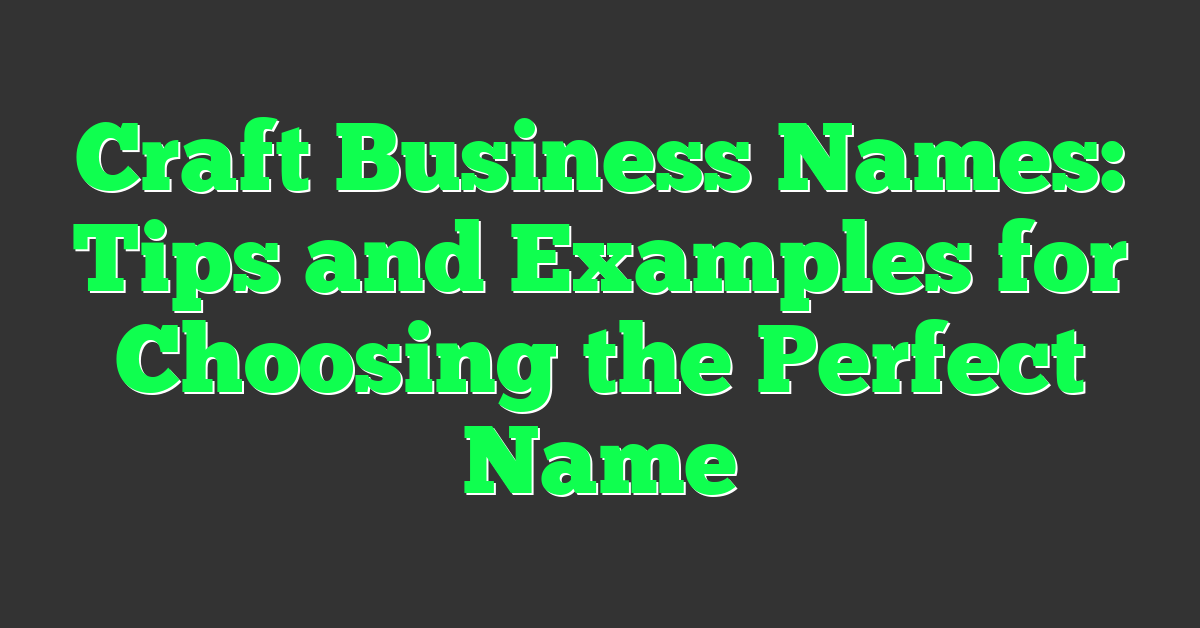Choosing the perfect name for your craft business can feel like a daunting task. It’s not just about finding something catchy; your business name needs to reflect your brand’s personality and resonate with your target audience. A well-chosen name can set you apart in a crowded market and make a lasting impression.
I’ve spent years helping entrepreneurs find the right names for their businesses, and I’ve seen firsthand how the right name can elevate a brand. In this article, I’ll share tips and strategies to help you brainstorm and select a name that captures the essence of your craft business. Let’s dive in and uncover the secrets to a memorable and effective business name.
Importance of the Right Craft Business Name
A well-chosen craft business name shapes brand identity and influences customer perception. It serves as the first impression potential clients get.
Impact on Brand Identity
A craft business name defines the brand’s identity. Unique names can communicate creativity, professionalism, and industry relevance. Consistency in the name helps build brand recognition. For example, names like “Twist & Twine” or “Crafted with Love” reflect craft themes and foster brand cohesion. A strong name aligns with the brand’s mission, enhancing overall branding efforts.
Influence on Customer Perception
The choice of business name impacts how customers perceive the craft brand. Memorable names create a positive impression, making customers more likely to recall and recommend the business. For instance, a name like “Artisan’s Edge” suggests high-quality handmade products, prompting trust. Additionally, names that resonate with target customers can drive engagement and loyalty. Carefully chosen, they evoke specific emotions, connecting personally with the audience.
Creative Processes for Crafting Business Names
A thoughtful process for crafting a business name combines creativity with strategic thinking. Key methods like brainstorming and using name generators can produce stellar results.
Brainstorming Ideas
Brainstorming unveils a variety of potential names. I start by listing words and phrases that resonate with the craft business’s core values, products, and target audience. For example, a business specializing in handmade jewelry may draw inspiration from terms like “elegance,” “artisan,” and “bespoke.”
In collaborative sessions, I involve team members for diverse perspectives. This collective approach often sparks innovative combinations and new ideas. I also analyze competitors’ names to identify trends and gaps in the market, ensuring the name stands out.
Using Name Generators
Name generators offer a quick way to expand the list of potential names. I input keywords relevant to the business, like “craft,” “handmade,” or specific materials used. These tools generate unique combinations that might not emerge in traditional brainstorming.
I evaluate each generated name for brand fit, simplicity, and memorability. For instance, platforms like Shopify Business Name Generator and Namelix can produce creative and brand-appropriate suggestions. Choosing a name from these options saves time while aligning closely with the business identity.
Key Considerations When Choosing Craft Business Names
Choosing the right name for your craft business sets the tone for your brand and creates lasting impressions.
Relevance to Your Craft
Your business name should reflect the type of crafts you create. Names like “Stitch & Loom” convey a clear message if your focus is on textiles. Ensure the name not only represents your products but also your brand’s personality.
Ease of Pronunciation and Memorability
Select a name that’s easy to pronounce and remember. Short, simple names like “Crafty Minds” stick in customers’ minds and are less likely to be mispronounced. Complex names can lead to confusion and misspellings, which hampers online searches and word-of-mouth marketing.
Legal Considerations
Ensure the name you choose is available and legally sound. Conduct a trademark search through the U.S. Patent and Trademark Office (USPTO) or similar services to check for any existing trademarks. Registering your business name as a domain is also crucial to secure your online presence.
Real-Life Examples of Successful Craft Business Names
Successful craft business names often encapsulate creativity and distinctiveness, setting the brand apart in a crowded market. Examining these names helps identify key trends and lessons.
Analysis of Naming Trends
Craft business names frequently focus on elements like alliteration, wordplay, and imagery. These elements enhance memorability and brand identity. For instance:
- Twist & Twine: This name uses alliteration and textile-related terms, making it memorable and relevant.
- Artisan’s Edge: Combining a creative term with a sharp, professional word, this name evokes quality craftsmanship.
- Stitch & Loom: These terms immediately convey the nature of the business, ensuring customers understand the niche.
Many successful names include materials or techniques specific to their craft, helping potential customers quickly grasp the business focus.
Lessons from Established Brands
Established craft brands provide valuable insights into naming strategies. Here are a few lessons learned:
- Distinctiveness: Successful brands like “Paper Source” and “Michaels” choose names that stand out and avoid generic terms.
- Simplicity: Names like “Etsy” keep it simple, making them easy to recall and pronounce.
- Relevance: Brands such as “Craftsy” relate directly to the business activities, bridging customer expectations and brand narrative.
Examining these brands reveals that a successful craft business name creates an immediate connection, is memorable, and accurately represents the business’s creative essence.
Conclusion
Choosing the right name for your craft business is a crucial step in establishing a strong brand identity. It’s more than just a label; it’s the first impression you make on potential customers. By focusing on relevance, simplicity, and distinctiveness, you can create a name that resonates with your audience and sets you apart from the competition.
Remember to consider legal aspects and ensure your name is easy to pronounce and remember. Whether you use brainstorming or name generators, aim for a name that captures the essence of your creativity and craftsmanship. Following these guidelines will help you build a memorable and effective brand.

